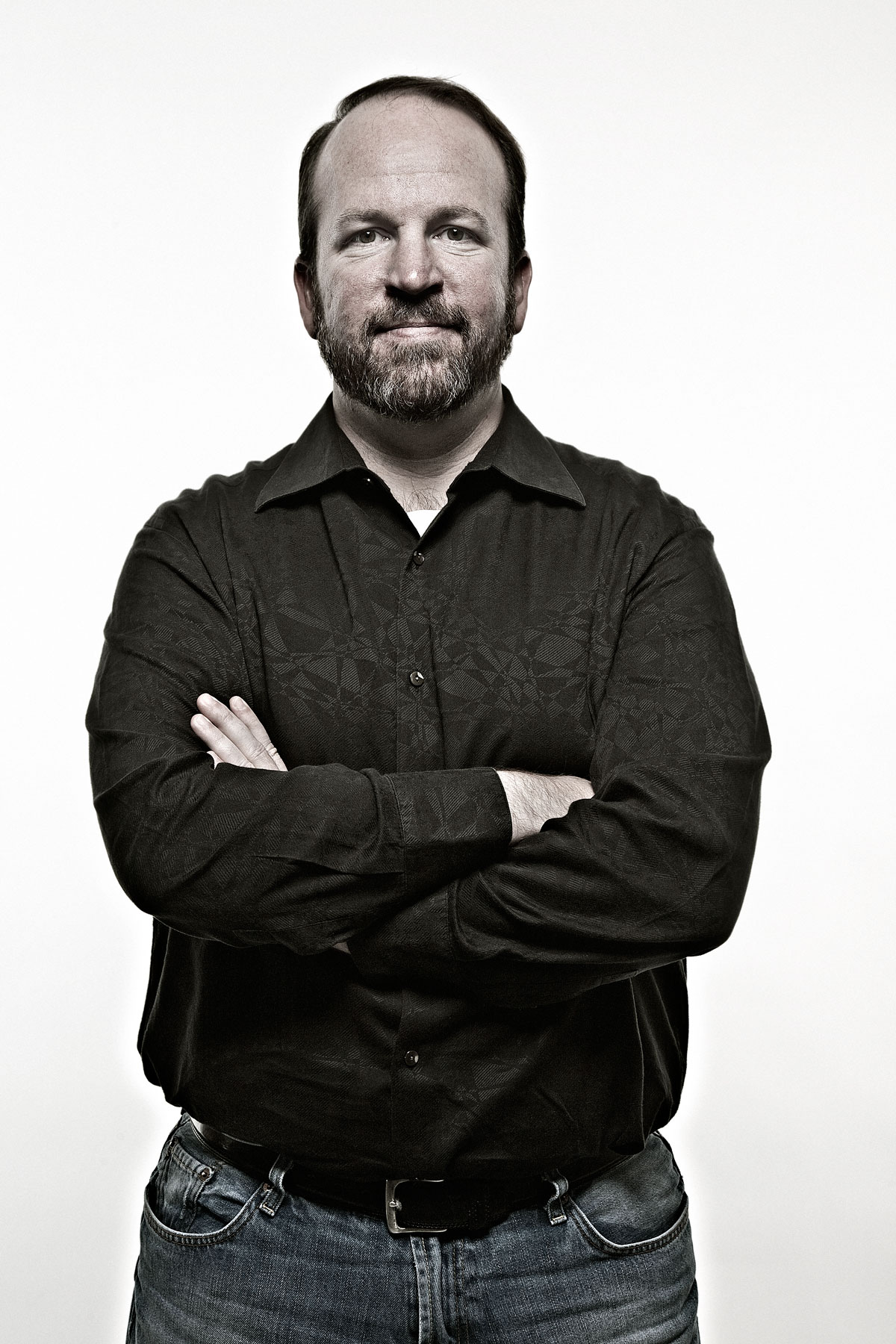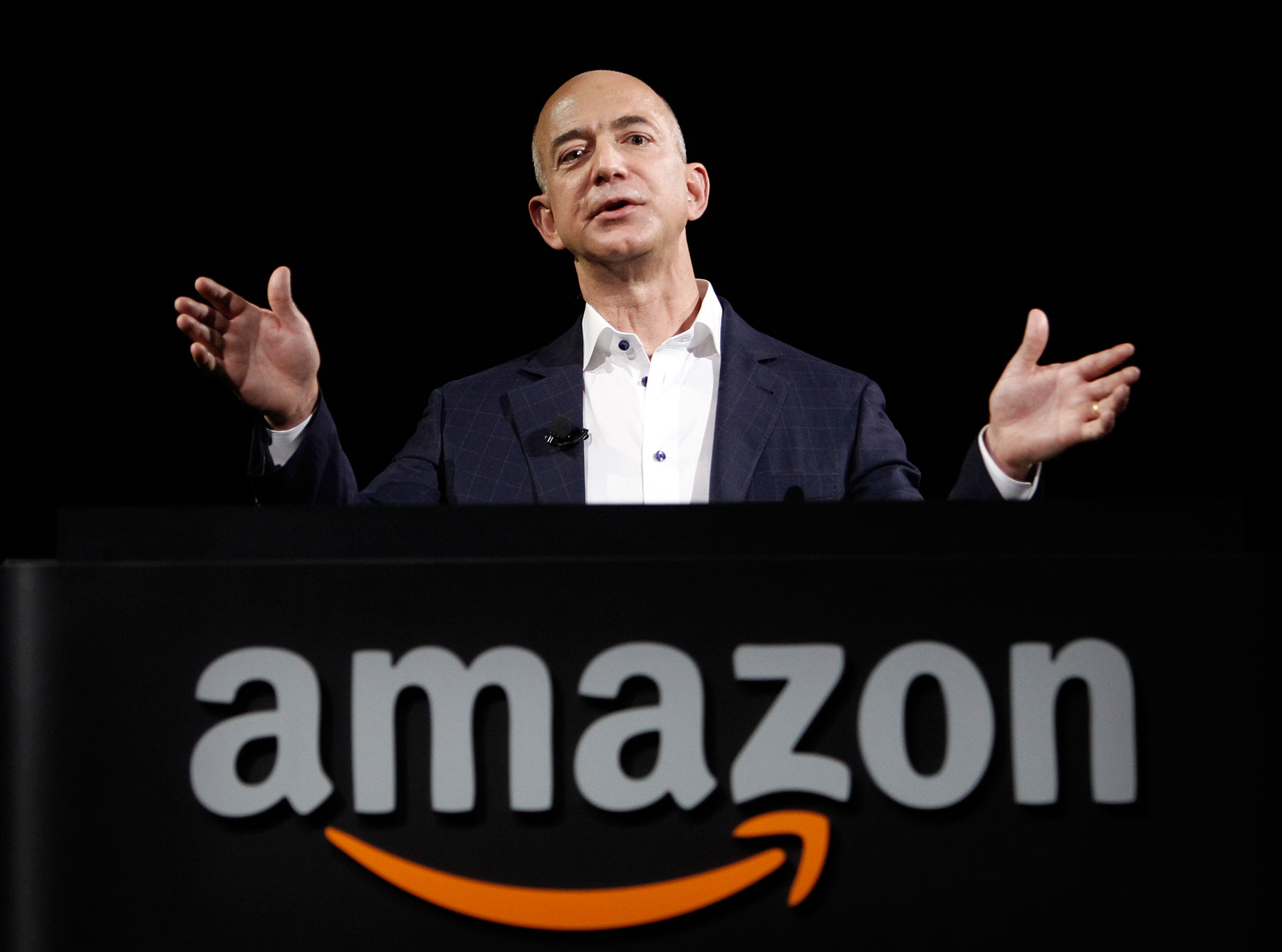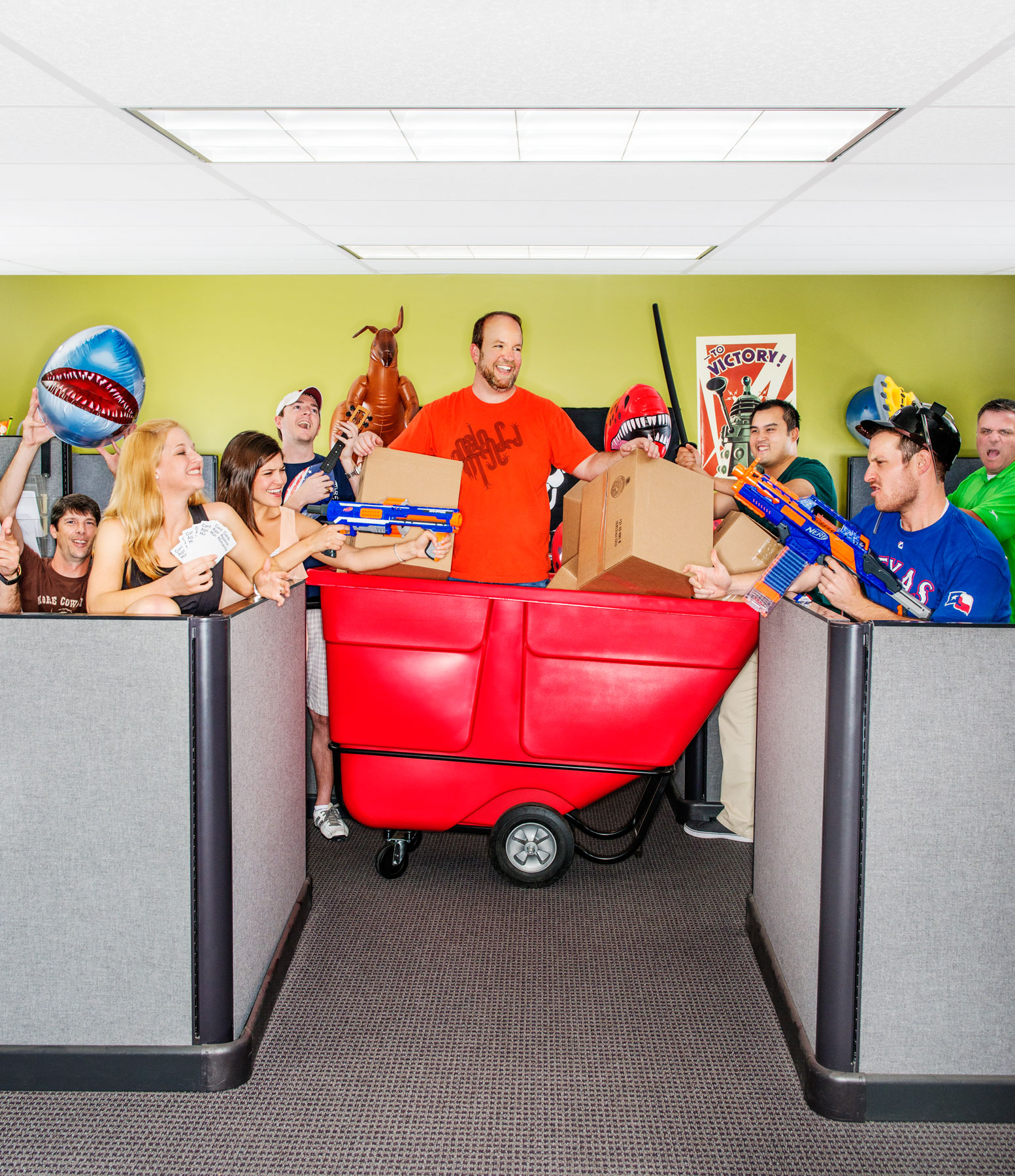The breakfast with Jeff Bezos started awkwardly and ended with an indignity that Matt Rutledge didn’t even catch at first. The waitress at Lola, a trendy Seattle restaurant owned by celebrity chef Tom Douglas, didn’t recognize Bezos. But she sensed she should have. When she stumbled over his name, he explained that his father was Cuban, which, in terms of making a positive ID, probably wasn’t as helpful as saying, “I’m the guy who founded Amazon.”
Also seated at the table that Monday morning in 2010 were Bezos’ shadow, an up-and-coming Amazon executive who follows Bezos everywhere, watching how the CEO makes decisions; and the corporate development guy who’d put together Amazon’s recent $110 million purchase of Rutledge’s company. Bezos is better at business than he is at small talk. Rutledge would claim he himself has been lucky in the first field and is incompetent in the second. The breakfast unfolded with all the ease and grace of a tango danced by two beginners on painter’s stilts. The development guy did his best to keep things moving while the shadow looked on, learning God knows what.

At length, after a bit of business talk that maybe resembled a cousin of an actual breakfast meeting, Rutledge blurted out a question that had been troubling him: “Why did you buy Woot?”
For the uninitiated, the term “woot” is an expression of joy that sprang from online role-playing games, a portmanteau of “wow” and “loot.” Rutledge had bought the web address Woot.com in 2003 for $6,000, and the next year launched a site that sold stuff in a way no one had ever tried. Woot offered only one item per day, usually a gadget but maybe a wheel of cheese, and priced it so low that it oftentimes sold out in a matter of hours. When the items didn’t sell out, Woot put them in a Bag of Crap, a bundle that users bought blindly. Customer service pretty much began and ended with the suggestion that the customer put any unwanted or defective item on eBay.
Woot violated nearly every precept of retail. And it was wildly successful. Each weekday just after midnight Central Standard, a new item went up. It was an event. The site attracted a community of geeks who once flooded its discussion forum with 452 comments about a power adapter. At its height, Woot attracted 1 million daily visitors, to whom Rutledge was something of a rock star. By 2008, annual sales had eclipsed $164 million, and Inc. magazine named Woot the fastest-growing private retailer in the country (and the fastest-growing private company in North Texas). At that point, Amazon had already invested in the company. Then it bought the whole thing.
So there sat Bezos at the breakfast table, faced with a question for which he was apparently unprepared. Many painful seconds passed without an answer. Rutledge let the pause lengthen as long as he could bear it and was just about to tell his host to forget it, when Bezos finally spoke.
He looked down at his plate. Bezos had ordered a dish called Tom’s Big Breakfast, a preparation of Mediterranean octopus that includes potatoes, bacon, green garlic yogurt, and a poached egg. “You’re the octopus that I’m having for breakfast,” Rutledge remembers Bezos saying. “When I look at the menu, you’re the thing I don’t understand, the thing I’ve never had. I must have the breakfast octopus.”
Not until Rutledge had returned to Dallas and related the story to his anxious employees—now Amazon’s employees—did he realize just how absurd that explanation sounded. Before it can be eaten, generally, the breakfast octopus must be killed.
•••
None of it—Woot, the sale to Amazon that afforded him a 7-acre spread in Plano with its own lake, the launch this month of his next mad experiment in online retail—would have happened without the Apple II that his dad bought in 1979. Rutledge taught himself a little BASIC and wrote a quiz program for the periodic table. When his parents divorced, young Matt moved with Dad from San Antonio to Farmers Branch, then Carrollton. Eventually little brother Dave moved with Mom to St. Louis.
Rutledge did not distinguish himself in high school, which ended before he realized it would. Mom offered to pay for community college, so off he went to St. Louis and promptly began failing every class except tennis. This was 1989, when the computer industry was speeding up, and bulletin-board groups began holding meetups. Rutledge attended one such meeting and found it far more rewarding than school.
“I wasn’t particularly social,” he says. “So any ability to be social and meet people, to be a geek and find friends, was overwhelmingly fun for me.”
“You’re the octopus that I’m having for breakfast. When I look at the menu, you’re the thing I don’t understand, the thing I’ve never had. I must have the breakfast octopus.”
Jeff Bezos
His mom’s Camaro helped, too. Rutledge mounted a speaker under the hood and wired it to a keychain fob that made sound effects, so he could shoot a machine gun and a laser at other drivers. He met a computer technician and salesman named Ken Greenlaw who thought the setup was pretty boss and taught him how to work on computers. Rutledge dropped out of school to work at a computer store with Greenlaw, who went on to start his own business and hire him.
Eventually he bought his own car, a Mazda RX-7, which he opted to neither register nor insure. Multiply those infractions by a series of moving violations, throw in court costs for ignoring all of the above, and, in short order, the city wanted about $8,000 from Rutledge. Rather than pay up, he beat it back to Dallas and moved in with an old high school buddy who was still living at his mom’s house.
A series of jobs followed. He worked at the record store Sound Warehouse. He worked at a computer retailer called Resource Concepts. Then, in 1994, Rutledge started Synapse Micro, a wholesale hardware distributor that he would build into a $50 million business, before the internet and CompUSA and Fry’s destroyed the ecosystem of mom-and-pop computer shops. But before that happened, at both Resource and then with his own Synapse, Rutledge found himself in a setting that taught him a crucial lesson about selling crap.
The First Saturday swap meet started in 1972 as a market for ham radio enthusiasts. By the time Rutledge returned to Dallas in the early ’90s, First Saturday had grown to include computer hardware and all sorts of related gadgetry. Vendors set up Friday evening in a downtown Dallas parking lot. People arrived at midnight to shop in darkness, haggling over motherboards and hard drives as the sun rose on the first Saturday of every month. Enter Matt Rutledge—doing it his own way.
“On Friday night, I’d go to the bar,” he says, “probably the Salute Club on Midway. When the bar closed, I’d get a buddy, pay him a couple hundred bucks to come back to the warehouse with me and load up the Ryder truck. All the other guys had already set up their tables, wearing miner hats. This was grassroots stuff. But I was a closeout distributor with a bunch of returns already written off. So at 2 or 3 in the morning, everybody else is already set up, and we’re these assholes with bloodshot eyes trying to figure out how to park a truck in our spot at the last minute.”
Rutledge has a mischievous laugh that he lets loose in bursts. “You went to the bar, you were up late, and you made the best of it. I didn’t plan it that way. It just happened. And people knew who we were. I was almost like a drug dealer to them. They’d follow us, gather around the back of the truck when we threw the door up. ‘I’ve got these motherboards!’ You’re delirious. ‘No warranty! Who wants it for $10?’ You’re a jerk, but you’re having fun, taking cash, stuffing it in this pocket, making change from that pocket. People would come just to watch, not even buy anything. That was kind of cool.”
First Saturday was essentially a live rehearsal for what became Woot. Start selling at midnight. Clear out all the crap quickly. Make it an event. That’s why Rutledge was taken aback when Woot hit it big and people called the concept genius. “It was so bizarre to me to have so much fanfare,” he says. “I wasn’t trying to be innovative in e-commerce in the least bit. I was just selling stuff cheap.”

Woot did something else that Rutledge learned at First Saturday. It drew onlookers. Most online retailers monetize products they own and therefore focus on conversion rate, how many visitors buy something. Rutledge threw that metric out the window. What if Woot were also able to monetize its audience, those onlookers? Now you’ve got something that starts to look like a media company.
To do that, Rutledge enlisted his brother, Dave. While Rutledge had gone down a path toward computer hardware, his brother had headed into software. Dave dropped out of college, too, and taught himself programming and design. In the early ’90s, he ran a popular blog, before “blog” entered our vocabulary, called Geeklife, which taught him the importance of posting new content daily, no matter how stupid. So he handled the content side of the operation from St. Louis, eventually hiring five full-time writers to populate Woot’s expanding universe of nine sites, which included subdomains such as wine.woot.com and shirt.woot.com. The team workshopped jokes like Saturday Night Live writers, coming up with product descriptions not solely intended to sell. The write-ups were also meant to entertain and entice people to return every day (which, of course, wrecked the conversion rate).
Here is part of a Woot write-up from 2008. Remember what happened that year, and please don’t be discouraged by the length of the excerpt. This is worth it:
“Good day American taxpayer, complments of the season to YOu. Please allow me to introduce myself I am Mr. Henry PAULSON very high official of United States Treasury of United States, Washington, USA. I please to be writing you this day because someone of our mutual acquaintance Mr. BERNANKE vouch for you as trustworthy and gullible individual of high moral standards.
“Through no fault of my own I am come to hard straits and although I am a proud man and father, I must beseech your partnership in resolution, an urgent and vexing matter. Through malfeasance and rascality, certain individuals of my close acquaintance have sabotage national banking system, hence an imminent disaster will befall if I am unable to secure the amount of $700,000,000,000 DOLLARS U.S with all utmost haste. This amount is currently being held by millions of fellow Americans but thus far these scoundrels refuse to release the money to me on grounds of that it is not mine infact.
“Therefore I must, find a partner who can assist in the collection of this funds with, advance fee of $179.99 DOLLARS U.S a nominal amount I am sure you will agree. In return for you cooperation I am authorized to release as a token of my good faith to you one iRobot Scooba Floor Washing Robot, can thoroughly clean a floor with FOUR (4) cleaning stages, prep,wash,scrub,dry,
and include one bottle of 8 OZ. (8 ounce) Scooba Juice cleaning fluid. This robots can follow walls and crisscroos rooms without need of human agency. Not to be use on carpet, laminate, stone of course I am sure you understand. for such price you would not expect to buy such Scooba but I, can assure you.”
With Woot, the point was to make people laugh. Amazon did not get it.
The item’s Nigerian-email-scam description continued for another two paragraphs. Whether Woot sold its entire army of iRobot Scooba Floor Washing Robots is a fact perhaps now buried deep inside a spreadsheet stored on an Amazon cloud server. But, again, sales numbers weren’t entirely the point. The point was to make people laugh.
Amazon, as a corporation, did not get it. Maybe Jeff Bezos understood the breakfast octopus, but that understanding didn’t trickle down the chain of command. Rutledge says the top-level Amazon executives are all geniuses, but there’s a quick drop-off, and none of the politicking middle managers were capable of understanding Woot as a content company. They kept asking stupid questions about the retail side. For Woot, it didn’t make sense to talk about a standard discount the company provided consumers. It simply sold stuff at market-clearing prices. Sometimes Rutledge would sell crap so cheaply that it didn’t make sense—except that he wanted to see how quickly he could sell out.
“They were big on generating reports,” he says. “The amount of information in those reports—there’s a level of expectation there. And our reporting quality was nonexistent.”
On the creative side, Dave says, the pressure to sell killed the writing. “There was such a huge emphasis on growth,” he says. “If you have a day when something doesn’t sell great, someone says, ‘What the hell happened?’ Well, it’s the easiest thing in the world for a buyer or manager of buyers to point to the write-up. So people were saying, ‘Hey, I’m told I have to sell every single one of these things, and I really need you guys to write a more glowing write-up for this thing that you know is a piece of shit.’ ”
Amazon’s fundamental misunderstanding of what made Woot great can be seen today on the site. It sells many items simultaneously. It’s a marketplace, not an event. The write-ups are cute, not subversively funny. Woot is no longer a bug-eyed beast with eight tentacles. It’s a pancake with two smaller pancakes for Mickey Mouse ears and a smile made of whipped cream.
In 2012, two years into his three-year deal with Amazon, Rutledge walked. He won’t say how many millions his early departure cost him, but his contract with Amazon included a three-year non-compete clause from the date of sale, and he was watching the clock.
•••
Roughly two months prior to the planned late-June launch of his next big thing, Rutledge, wearing jeans and a t-shirt of obscure design, leads a tour of the standard-issue gray cubicles in his new office near Addison Airport, just a few miles from where Woot still has its headquarters. Within a year of his departure from Amazon, five other senior Wooters jumped ship to join him. All told, he has 35 employees now. He’s financing the business with his own money and jokes about his burn rate. The office space and the attached warehouse were once occupied by Heelys, the briefly red-hot company that made the shoe with the wheel in its heel. Remember it? No? Perfect closeout item for Meh.com.
Yes. It’s called Meh. The opposite of Woot. Hang on a second. We’ll get to that. First: Rutledge’s Mediocre Corporation operates Mediocre Laboratories, which will conduct a series of what he calls e-commerce experiments. The first one, concluded late last year, was called the Seligman Experiment. If you’re curious about the name “Seligman,” you are encouraged, in keeping with Woot’s founding concept of customer service, to Google it. For Mediocre, here’s how it worked:
Rutledge sent $20 Amazon gift cards to the first 1,000 people who signed up as Mediocre members (they’d seen a TechCrunch story about Mediocre’s launch and had signed up without even knowing what being a Mediocre member meant). He asked each recipient to use the $20 to buy stuff for the Mediocre office. The recipients could, of course, opt to keep all or part of the $20 gift. The response was striking.
About 75 percent of recipients used at least part of their Amazon cards to send something to A Mediocre Corporation, spending more than half of the $20,000 that Mediocre had laid out for the experiment. Six people pooled funds to send a $125 giant wall sticker of a lab rat that now greets visitors in
the Mediocre lobby. Mediocre also took delivery of a hamburger beanbag chair, 39 pounds of fertilizer (an actual bag of crap), 31 copies of the book Abundance: The Future Is Better Than You Think, and 15 wall clocks that made possible a meta wall clock made entirely of wall clocks (with three wall clocks to spare).
Rutledge proudly shows off the Seligman-generated office items and declares that the experiment was either utterly worthless or the most valuable thing he’s ever done. He’s not yet sure which is the right conclusion. In either case, he intends to press on. Which brings us to Meh.
It is unclear at this writing whether permission has been granted to reveal what Rutledge paid for the Meh.com URL, but if you guessed that the sum was more than 10 times what he paid for Woot.com, then you deserve an Amazon gift card, because Rutledge paid $100,000. “I call him Larry the domain guy,” Rutledge says of the guy who sold it to him, “because his name is Larry.” He lets loose one of those laughs. “He’s really eccentric. He was on the internet before it was the internet, and he’s always trying to sell me domains. I didn’t have to walk up and say, ‘How much is that domain? My name’s Matt Rutledge. Google me, bitch.’ ” Another burst of laughter.
Rutledge allows that some people will probably think that Meh sounds a little meh. “The cliché thing, the least exciting way to look at what I’m doing again, is that I’m a jaded entrepreneur,” he says. “You know, sold my company, didn’t like the large corporation, and I’m just doing it again.”
Judge for yourself: just after midnight every day, Meh will offer one new item for sale, the write-up for which should generate as many laughs as it does sales. Rutledge talks about running the site the way Trey Parker and Matt Stone run South Park, with as little lead time as possible, so that Meh can comment on current events. There will be no social media, no liking, no sharing, no email sign-up. He thinks email is a brand-damaging annoyance. The site should be compelling enough that people won’t need to be reminded to go to it. Repeat visitors who don’t buy stuff can click a “meh” button that will increase their prestige in the Meh community. He says, “Many people will be like, ‘But it’s a store. Why would you do that?’ That’s the fun part.”
After that experiment, others will follow. At a recent Mediocre Corporation happy hour, employees came up with the URL Crapwithfriends.com. Then they invented the business model. Each visitor buys an item for the next visitor, thereby receiving a surprise item from the previous visitor. And then there’s Spite.com, whose (even more insane) business model lies beyond the scope of this article.
“It’s important,” Rutledge says, “to retain the ability to say, ‘Fuck it.’ ” Then he thinks for a minute about how difficult it is to retain that ability given how much higher the stakes have grown since he started Woot. This time around, he won’t be some anonymous guy trying to unload a warehouse of robot lawnmowers. Google him, bitch. He’s Matt Rutledge, trying to unload a warehouse of robot lawn mowers, while making you laugh. If he’s a rock star to a certain community of geeks, then this is his sophomore album. There are expectations. Rutledge concludes: “It’s actually easy to say, ‘Fuck it.’ What’s hard is figuring out when it’s advisable to do so.”
In his conference room at Mediocre headquarters, Rutledge laughs like he’s got a yellow Porsche Cayenne Turbo parked out front, which he does. “If nothing else,” he says, “I will enjoy it.”







